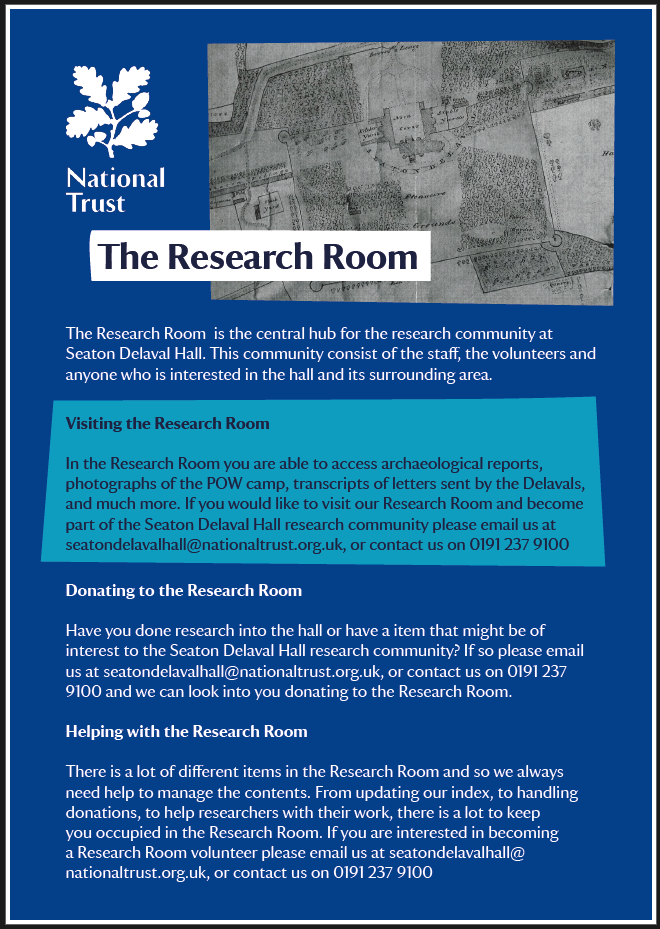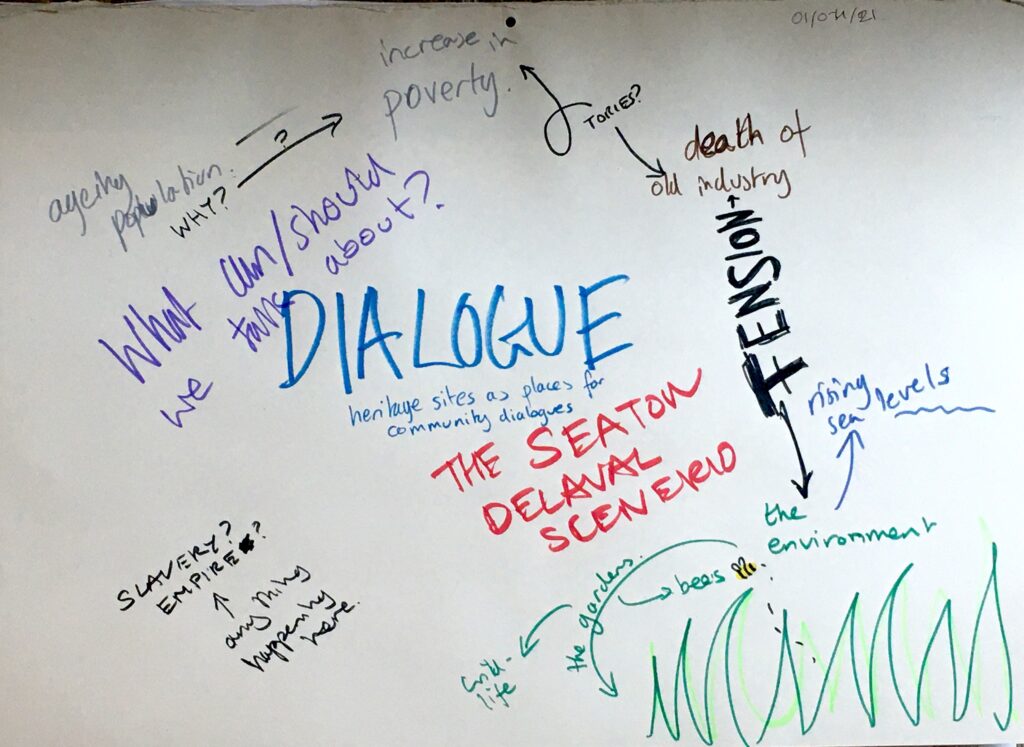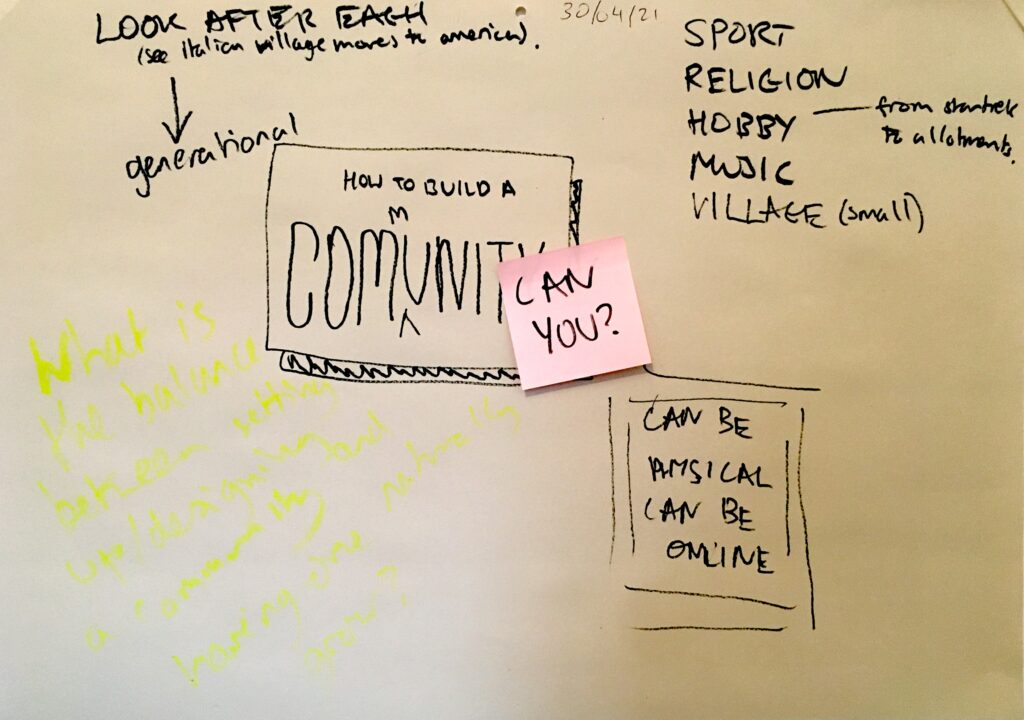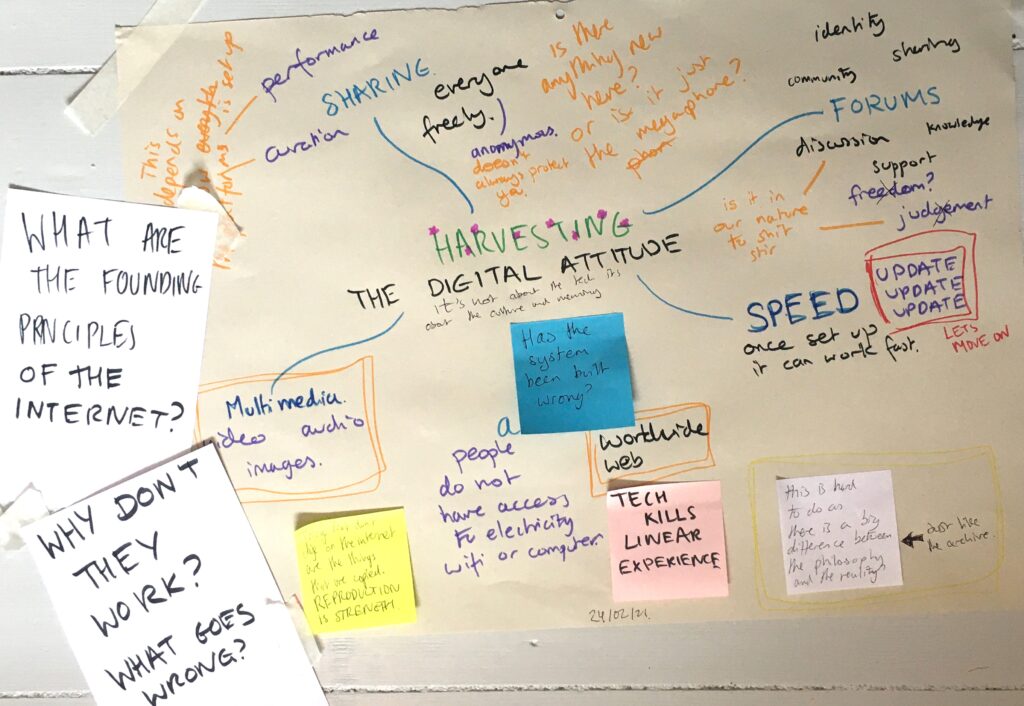
Tag Archives: Community
OHD_MDM_0029 How to build a community
OHD_MDM_0021 The Digital Attitude (Harvesting) mind map
OHD_BLG_0043 Philosophy is easier than reality
On Monday 11th April 2022 I attended and ran a workshop at the Seaton Delaval Hall Community Research Day. It was an exceptionally interesting affair and mostly certain did not go the way I imagined. If I had to sum it up I would describe it as engaging but impractical. To say that it got deep real quick would be an understatement but the to which it went was fascinating. It was also great to just bounce ideas off people. However it felt like whenever I attempt to move the conversation to getting to more practical solutions people rather stayed in philosophical and imaginary realm or they would just explain why it would not be possible to change that.
Maybe I am too much of a designer, wanting to think of solutions instead of sticking to the status quo. Or maybe this is exactly what I should be doing, building a bridge between the imaginary realm and the real world. Maybe this is the point that Verganti talks about when he discusses ‘Interpreters’. The people in that room on Monday were my interpreters, the people I can draw on for inspiration and ideas…
If this is the case it is now my job to turn the “multi-verse” of history that we kept talking about into reality. No pressure….
OHD_BLG_0046 the nerd filter
The nerd filter is an idea that I have been mulling over for a while now. The basic principle is that you gain more access to an archive the more time you spend in the archive and interacting with the archivists. In other words as you get more integrated into the community of the archive you are able to view more sensitive documents. I see it as a type of social trade. The user invest their time into the archive and exposes themselves to the eyes of the archivist and in return they gain trust and access to other documents. The reason it is called the nerd filter is because those who are not as passionate or “nerdy” will eventually give up and leave the archive community. The people who are then left behind are the proper nerds, who have a significant amount of social capital with the archive. My theory is that these leftover nerds will be more responsible with archive material because they risk losing the access they worked so hard for if they betray the archive community.
It is like a type of loyalty card scheme, but whether it will be taken on by archives is another question…
OHD_BLG_0067 Sites of Conscience
by Liv Ševčenko
“Heritage can never be outside politics – it is always embedded in changing power relations between people.“
“integrating dialogue into every stage of heritage management, from planning to preservation to interpretation, and allowing for continual evolution.”
Museums are great at showing history, but they always do this through the lens of the present. And the present has this annoying habit of constantly changing, this means that the lens used to initially set up the exhibition is probably out of date by now.
The International Coalition of Sites of Conscience fights this problem by setting up heritage sites as places for open dialogue about contemporary problems. They do this by obviously working with the community but also continuously mining their history for perspectives on problems. It’s continuous baby! And exactly what I want to do!
Also super fun idea of incorporating discussions on how to set up an exhibition into the exhibition.

Above you see my brainstorm around what dialogues we could possibly do a SDH, bu I think that other people are way more suited to think about this. However it will be a good exercise to do with people.
OHD_BLG_0072 Community archives and the health of the internet
By Andrew Prescott
This was great. A very helpful piece of writing that was in the recommend reading for my seminar Digital Culture: Collaborative projects.
The bulk of the text discussed community archives or counter archives, as I have previously called them. Prescott discusses how these archives have been forced to work on commercial platforms like Facebook and Instagram. But on the flip side these archives do create a sense of community around the archival material, which often cannot be found in brick and mortar archives (BAM archives). This community archives in a way that is contrary to all the systems and rituals that take place in BAM archives. It’s chaotic and there is no categorisation at all. But it is being used.
Now this is where an interesting paradox comes into play. The more i read about archives the more I see the importance of building a community and tradition around a history. Oral traditional survive because of strong communities. A strong community therefore equals pretty good sustainability of a history. However, this is where the paradox comes in because currently these communities are hosted on commercial platforms that have no proven longevity or sustainability. Counter or communities archives often do not have a sustainability plan which has caused many to disappear. So the question is how can we capture the sustainability housed in strong communities while avoiding the pitfalls of modern technology?
However there is another far more consequential down side to counter archives being housed on social media – radicalisation. Due to the algorithms that operate on social media platforms these groups can become breeding grounds for radicalisation. They are community bubbles and you never know how far away you are from a new recommended group.
OHD_BLG_0101 Reading Group – 20/10/20
TOPIC: Oral history and the environment
Papers read:
“Drought, Endurance and ‘The Way Things Were’: The Lived Experience of Climate and Climate Change in the Mallee” by Deb Anderson
“Bringing a Hidden Pond to Public Attention: Increasing Impact through Digital Tools” by Anne Valk and Holly Ewald
Overall good, fun papers that everyone agreed with.
Oral history for legislation
Because the topic was environment, the oral history projects outlined in the papers were great examples of how oral history could feed into legislation. The paper by Anderson illustrated how the human experience of climate change makes the issue more tangible for people. Instead of the climate change just being stats and numbers. Valk and Ewald’s project re-engages people with nature but the sustainability and legacy of the project will show its true power.
The future is always better
The writers of the papers and the oral historians in the group seemed to suggest that it is often the case that people talk about the future in a positive sense. It is as if the nostalgia of the past gives people hope for a better future. Which in the case of climate change is remarkable but human’s are strangely optimistic.
Who don’t we interview
I keep finding cases where people wonder about why we do not interview certain people. Oral history is meant to “represent the voice of the people” yet there are still many voices left out. For example in Anderson’s paper she only interviews people who are still in the Mallee and not those who left the Mallee because of the trouble climate change was causes. Similarly I wondered during the reading group on #BLM why people hadn’t interviewed the people who would have been affected by the activism of those who had been interviewed.
It was brought up during the session that there is a lack of oral history projects based on our relationship with nature. We seem very obsessed and busy with industry but less so with nature. Both the papers have projects that are based in the countries where there were indigenous people before the europeans came. These indigenous must have had a relationship with the land before the people being interview and in some cases stories about the nature and land might have been passed down over generations. Why aren’t we recording those.
And finally America is doing something better than us…?
No, not messing up their democracy. But grass roots community oral history projects are more common in America than here. Let’s change that!

